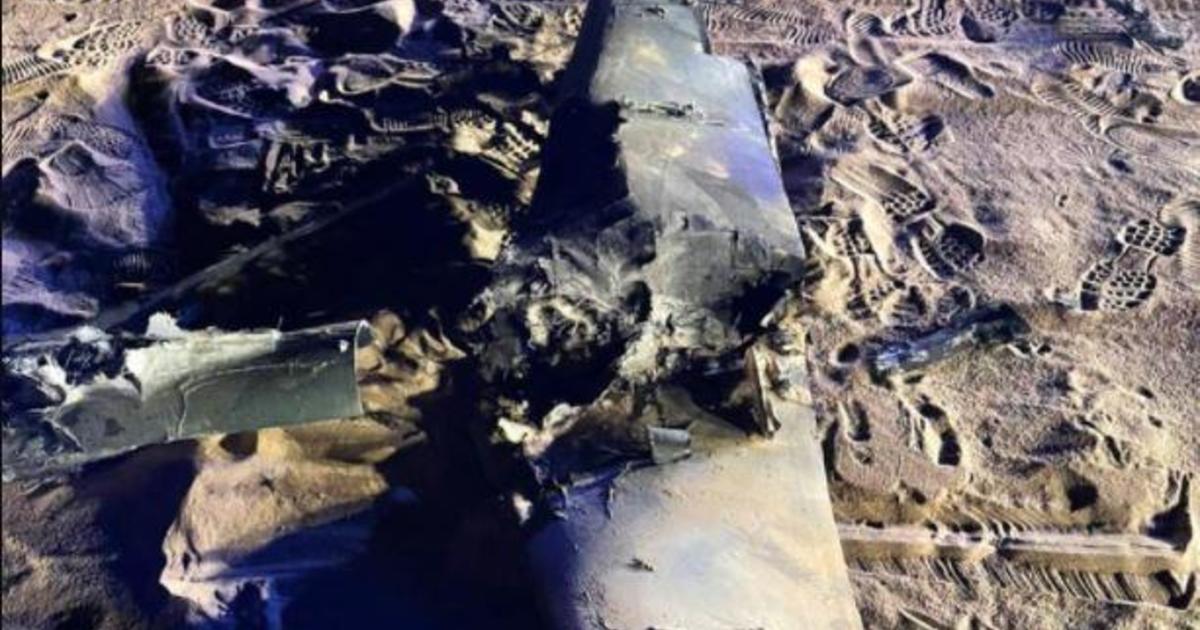Saudi Arabia said on Friday that its air defense systems intercepted a ballistic missile over the southern city of Najran. It was the last in a series of growing attacks by Iran-backed Houthi rebels, which consistently target Saudi infrastructure in retaliation to Saudi leaders war against their insurgency in neighboring Yemen.
Another missile hit an Aramco oil distribution terminal in the city of Jizan overnight, leading to a fire in one of the terminal’s tanks, Saudi Arabia’s Ministry of Energy said in a statement.
The Houthis were quick to claim the attacks, along with attempts to attack with kamikazi drones.
Al Ekhbariya / Saudi Broadcasting Authority
“Our armed forces targeted vital and military headquarters and facilities belonging to the Saudi enemy, with eighteen drones and eight ballistic missiles,” Houthis military spokesman Yahya Sareaa said in a television statement on Friday, promising that the attacks would continue.
Saudi state media showed images of debris allegedly from several drones loaded with explosives, which the Defense Ministry said were launched into the kingdom by the Houthis. The ministry condemned the “cowardly” attacks in a statement posted on Twitter and accused the Houthis of threatening the power supply.
The latest attacks came just days after Saudi Arabia offered a new proposal to end the war in Yemen, in which the kingdom supported the government against the Houthis. Saudi Arabia’s foreign minister, Prince Faisal Bin Farhan, presented the plan on Monday, which would include an immediate UN-supervised ceasefire, the reopening of the airport in the Yemeni capital, Saana, and the military coalition led by Saudis lifting the blockade on the rebel port of Hodeidah.
As a gesture of goodwill, the Saudi-led coalition on Friday released four fuel ships to dock at Hodeidah, a strategic port on the Red Sea, according to local media reports.
The Houthis rejected the openings and reiterated their demand that the Saudi coalition immediately lift the entire air and sea blockade in order to stifle supplies to its territory, which covers most of Yemen.
“How is it that those who launched the war now claim that they are eager to mediate peace in our country?” Houthi leader Abdul-Malik al-Houthi said in a televised speech on Thursday. “The lifting of the blockade and other humanitarian issues could not be part of any political or military negotiations. We would never accept that ”.
Andrew Harnik / AP
Meanwhile, Washington’s special envoy to Yemen, Tim Lenderking, returned to the region on Friday in a new pressure to bring the warring parts of Yemen to the negotiating table. The veteran American diplomat returned just two weeks ago from his second trip to the region, where he held meetings in four countries to try to broker a ceasefire.
Chief Houthi negotiator Mohamed Abdel Salam said on Friday that Oman-mediated negotiations with the US envoy and the Saudis were still underway, even when Houthi forces launched new attacks against Saudi Arabia.
“The exchange of ideas and proposals is underway with the United States and UN envoys, as well as with the Saudis, through the brothers in the Sultunate of Oman,” he told the Arab network Aljazeera. “The discussions revolve around humanitarian efforts, in addition to other measures presumed to reach a ceasefire and pave the way for political dialogue.”
But Saudi Arabian leaders say the latest Houthi attacks are further evidence that the rebels are not really interested in ending the war.
“The attack on the oil distribution station in Jizan and the attempt to target civilians is a confirmation of the rejection of the Houthi terrorist militia to the Kingdom’s initiative to end the Yemen crisis and an affirmation of Iranian tutelage over the political and military decision of the militia, “the Saudi Defense Ministry said in a statement on Friday.
The war in Yemen entered its seventh year this week. The UN humanitarian office estimates that the conflict – considered by many to be a proxy war between the arch-rivals of Saudi Arabia and Iran, at the expense of the Yemeni people – has cost at least 233,000 lives, mostly civilians.
The UN said the conflict is taking the worst man-made humanitarian crisis in the world.
While the United States still supports the Yemeni government in February, President Joe Biden announced the end of US support for Saudi-led coalition offensive operations and called for an end to the conflict.
“This war must end,” said Biden in his first major speech on foreign policy after taking office.


